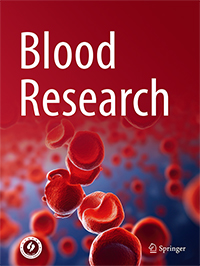Letter to the Editor
 Split Viewer
Split Viewer
Blood Res 2020; 55(1):
Published online March 31, 2020
https://doi.org/10.5045/br.2020.55.1.68
© The Korean Society of Hematology
Response to the letter by Langabeer on ?Retrospective screening for Philadelphia-negative myeloproliferative neoplasms in patients with cerebral infarctions as revealed using the revised 2016 World Health Organization diagnostic criteria‰
Correspondence to : Ik-Chan Song
Division of Hematology/Oncology, Department of Internal Medicine, College of Medicine, Chungnam National University, 266 Munhwa-ro, Daejeon 35015, Korea
E-mail: petrosong@naver.com
This is an Open Access article distributed under the terms of the Creative Commons Attribution Non-Commercial License (http://creativecommons.org/licenses/by-nc/4.0) which permits unrestricted non-commercial use, distribution, and reproduction in any medium, provided the original work is properly cited.
TO Dr. LANGABEER
Thank you for your interests in our observations and good suggestions. Thromboembolism can precede overt presentation of a myeloproliferative neoplasm (MPN) by a few years. In this context, your suggestions on the molecular testing in stroke patients may be reasonable. Mayo Clinic has screened
Authors' Disclosures of Potential Conflicts of Interest
No potential conflicts of interest relevant to this article were reported.
- Pardanani A, Lasho TL, Hussein K, et al. JAK2V617F mutation screening as part of the hypercoagulable work-up in the absence of splanchnic venous thrombosis or overt myeloproliferative neoplasm: assessment of value in a series of 664 consecutive patients. Mayo Clin Proc. 2008;83:457-459.
- Xu X, Zhang Q, Luo J, et al. JAK2(V617F): Prevalence in a large Chinese hospital population. Blood. 2007;109:339-342.
- Trifan G, Shafi N, Testai FD. Implications of janus kinase 2 mutation in embolic stroke of unknown source. J Stroke Cerebrovasc Dis. 2018;27:2572-2578.
Article
Letter to the Editor
Blood Res 2020; 55(1): 68-68
Published online March 31, 2020 https://doi.org/10.5045/br.2020.55.1.68
Copyright © The Korean Society of Hematology.
Response to the letter by Langabeer on ?Retrospective screening for Philadelphia-negative myeloproliferative neoplasms in patients with cerebral infarctions as revealed using the revised 2016 World Health Organization diagnostic criteria‰
Ik-Chan Song
Division of Hematology/Oncology, Department of Internal Medicine, College of Medicine, Chungnam National University, Daejeon, Korea
Correspondence to:Ik-Chan Song
Division of Hematology/Oncology, Department of Internal Medicine, College of Medicine, Chungnam National University, 266 Munhwa-ro, Daejeon 35015, Korea
E-mail: petrosong@naver.com
This is an Open Access article distributed under the terms of the Creative Commons Attribution Non-Commercial License (http://creativecommons.org/licenses/by-nc/4.0) which permits unrestricted non-commercial use, distribution, and reproduction in any medium, provided the original work is properly cited.
TO Dr. LANGABEER
Thank you for your interests in our observations and good suggestions. Thromboembolism can precede overt presentation of a myeloproliferative neoplasm (MPN) by a few years. In this context, your suggestions on the molecular testing in stroke patients may be reasonable. Mayo Clinic has screened
Authors' Disclosures of Potential Conflicts of Interest
No potential conflicts of interest relevant to this article were reported.
References
- Pardanani A, Lasho TL, Hussein K, et al. JAK2V617F mutation screening as part of the hypercoagulable work-up in the absence of splanchnic venous thrombosis or overt myeloproliferative neoplasm: assessment of value in a series of 664 consecutive patients. Mayo Clin Proc. 2008;83:457-459.
- Xu X, Zhang Q, Luo J, et al. JAK2(V617F): Prevalence in a large Chinese hospital population. Blood. 2007;109:339-342.
- Trifan G, Shafi N, Testai FD. Implications of janus kinase 2 mutation in embolic stroke of unknown source. J Stroke Cerebrovasc Dis. 2018;27:2572-2578.






 PDF
PDF Standard view
Standard view Export citation
Export citation Share
Share  Previous Article
Previous Article



